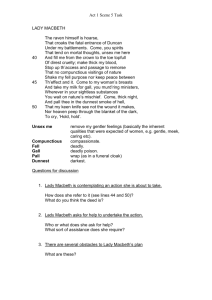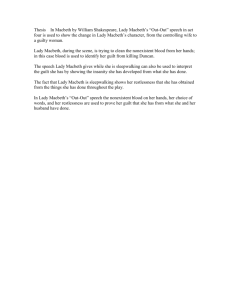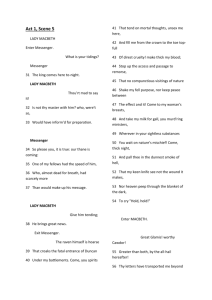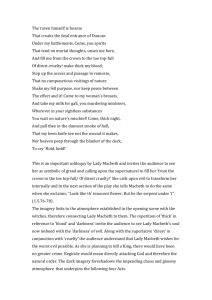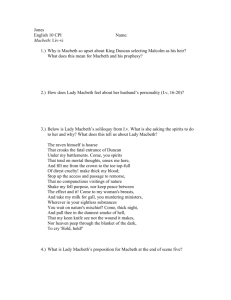Rebecca Barth - AP Literature
advertisement
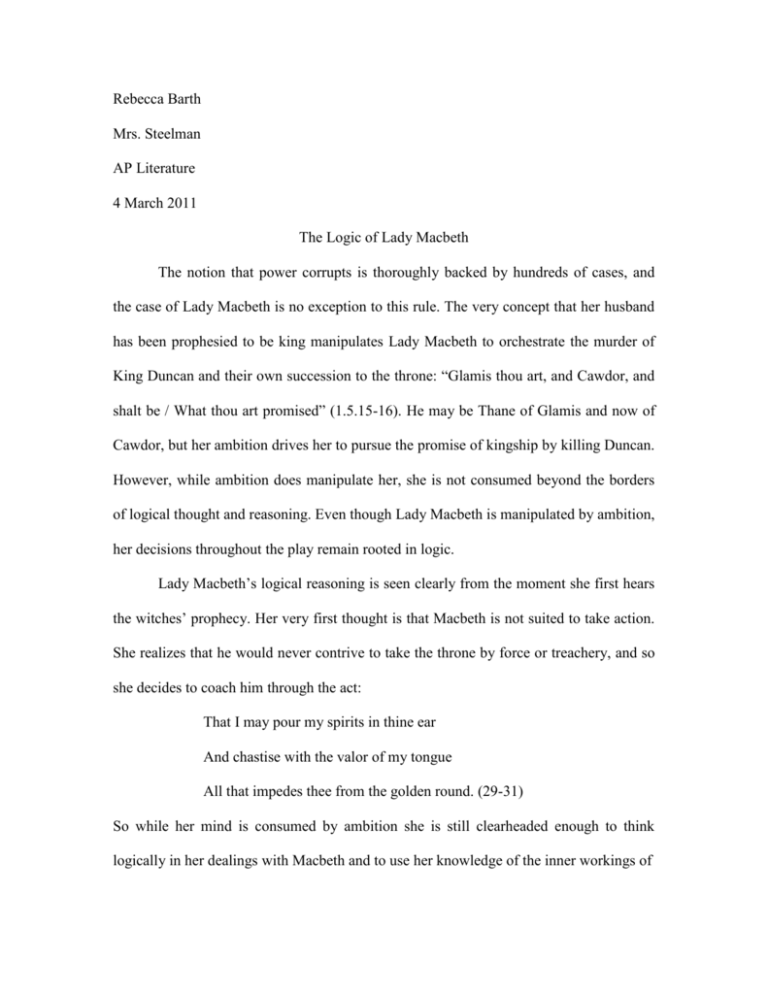
Rebecca Barth Mrs. Steelman AP Literature 4 March 2011 The Logic of Lady Macbeth The notion that power corrupts is thoroughly backed by hundreds of cases, and the case of Lady Macbeth is no exception to this rule. The very concept that her husband has been prophesied to be king manipulates Lady Macbeth to orchestrate the murder of King Duncan and their own succession to the throne: “Glamis thou art, and Cawdor, and shalt be / What thou art promised” (1.5.15-16). He may be Thane of Glamis and now of Cawdor, but her ambition drives her to pursue the promise of kingship by killing Duncan. However, while ambition does manipulate her, she is not consumed beyond the borders of logical thought and reasoning. Even though Lady Macbeth is manipulated by ambition, her decisions throughout the play remain rooted in logic. Lady Macbeth’s logical reasoning is seen clearly from the moment she first hears the witches’ prophecy. Her very first thought is that Macbeth is not suited to take action. She realizes that he would never contrive to take the throne by force or treachery, and so she decides to coach him through the act: That I may pour my spirits in thine ear And chastise with the valor of my tongue All that impedes thee from the golden round. (29-31) So while her mind is consumed by ambition she is still clearheaded enough to think logically in her dealings with Macbeth and to use her knowledge of the inner workings of Barth 2 his mind -and the faults that lie there- to manipulate him into obliging her. She knows exactly how to counter those faults which are currently impeding him from obtaining the throne. Lady Macbeth advises her husband throughout the play, but the most significant time is when she first tells him her plan: To beguile the time, look like the time; bear welcome in your eye, Your hand, your tongue. Look like th’ innocent flower, But be the serpent under’t. (1.6.75-78) She advises him as to how he should act around the king so as not to draw suspicion to their intentions. Again she proves that she knows her husband very well. She is aware of his lack of proficiency in the art of deception and his incompetence concerning matters of cunning. Lady Macbeth knows when her husband is in need of some advice and she advises him often, but when her counsel fails, she reasons that he needs a little push in the right direction and she turns to manipulation: When you durst do it, then you were a man; And to be more than what you were, you would Be so much more the man. (1.7.56-58) Here Macbeth tries to back out of her scheme and she questions his manhood, saying that he was a man when he agreed to kill the king, but if he backs out now he will not be a Barth 3 man. If, however, he goes through with her design then he will be a real man. She manipulates him into cooperating with her idea because she knows she cannot fulfil the plan by herself. The plan itself is a beautifully constructed piece of work. Lady Macbeth develops the perfect strategy to put her husband on the throne while deflecting the blame elsewhere. Her strategy is logical, and as far as assassination attempts go, quite simple. Her first insight comes after hearing that the king will be coming to visit them at Glamis castle, but only for one night: “O never / Shall sun that morrow see!” (1.6.71-72). She seizes the opportunity as it presents itself and knows that the perfect time to kill him is when he is staying at their castle, hence she states that he will not live to see tomorrow. When the king arrives she puts the first part of her plan into action; playing the innocent and faithful servant: All our service In every point twice done and then done double, were poor and single business to contend Against those honors deep and broad wherewith Your majesty loads our house. (1.6.18-22) She uses flattery on him, saying that everything she has done to prepare for his visit cannot do him justice since they are so honored that he should deign to pay them a visit at all. In this way she brings his guard down and also paints a picture of innocence for after the murder has been committed. For who would ever suspect that two such devoted subjects would murder their king? Barth 3 The murder itself is the second part of her clever scheme and proves that she was more than capable of thinking logically for all the manipulative force of ambition pushing down on her: When in swinish sleep Their drenched natures lies as in a death, What cannot you and I perform upon Th’ unguarded Duncan? What not put upon His spongy officers, who shall bear the guilt of our great quell? (1.7.77-82) Her part in the murder is to ensure that the servants become thoroughly intoxicated, while it is Macbeth’s job to kill Duncan using the servants’ daggers. Since the servants will be drunk and sleeping like the dead, they can easily be set up to take the blame of the murder, thus freeing the guilty mastermind and her husband from culpability. The third part of her strategy is to further frame the two servants by smearing Duncan’s blood on them. When her incompetent husband returns carrying the murder weapons with him, Lady Macbeth is furious because the daggers were supposed to be left with the servants in order to complete the set up. Lady Macbeth, when she cannot convince her husband to do so, decides to take the daggers back herself and, “If he do bleed, / I’ll gild the faces of the grooms withal, / For it must seem their guilt” (2.2.71-73), she smears the servants with Duncan’s blood. This provides her with the perfect scapegoat. So not only has she arranged her own innocence, but she has also gone one step further saying ‘Look at us humble servants of the King. Yes, he was killed in our Barth 3 home, but see, those servants are covered in his blood’. How could they be suspected when compared to the obvious guilt of the servants? After the body has been found, Lady Macbeth decides to faint in fake horror at this horrible crime that has been committed so that she may appear innocent and fragile, crying, “Help me hence, ho” (2.3.38), as she faints. She could not very well simply stand there impassively while everyone else reacted with shock and horror. With this final act her ingenious scheme has reached its completion. But she does not lose her ability to reason just because she has ascended to the top of the social hierarchy as queen. Even though at this point in the play appearances lead readers to assume that the Lady Macbeth has lost her mind, as Malcolm’s troops draw near the castle she makes one last intellectual decision. She seems to have retained enough logic to commit suicide. Malcolm must remove everyone standing in his way in order to reclaim his father’s throne. The Lady Macbeth would undoubtedly have been viewed as a threat to his succession to the throne, and thus Malcolm would have ordered her killed. Her suicide is a daring act that saves her from a much more painful death at the hands of Malcolm’s army. All of Lady Macbeth’s actions in dealing with Macbeth, forming a plan, carrying out the plan, and even committing suicide, are securely rooted in logic. In logic lies the answer behind Lady Macbeth’s ambitious actions. Actions that explain how her decision to murder are inevitable because between the logic of taking advantage of an opportunity and the corrupting power of ambition, she never stood a chance. Logic governs all of her decisions and actions even while ambition manipulates her into making them.

